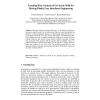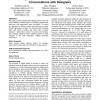163 search results - page 3 / 33 » Learning from rehabilitation: A bi-manual interface approach |
TAMODIA
2008
13 years 6 months ago
2008
This paper addresses software plasticity, i.e. the ability of interactive systems to adapt to context of use while preserving user-centered properties. In plasticity, a classical a...
JUCS
2006
13 years 4 months ago
2006
We outline the Berlin Brain-Computer Interface (BBCI), a system which enables us to translate brain signals from movements or movement intentions into control commands. The main co...
JMLR
2010
12 years 11 months ago
2010
Brain-computer interfaces (BCIs) are limited in their applicability in everyday settings by the current necessity to record subjectspecific calibration data prior to actual use of...
PUC
2006
13 years 4 months ago
2006
Traditional remote controls typically allow users to activate functionality of a single device. Given that users activate a subset of functionality across devices to accomplish a p...
CHI
2010
ACM
13 years 8 months ago
2010
ACM
This paper presents insights about design practices that can lead to effective and fun games for learning, gleaned from interviews with experienced game developers. We based our a...


